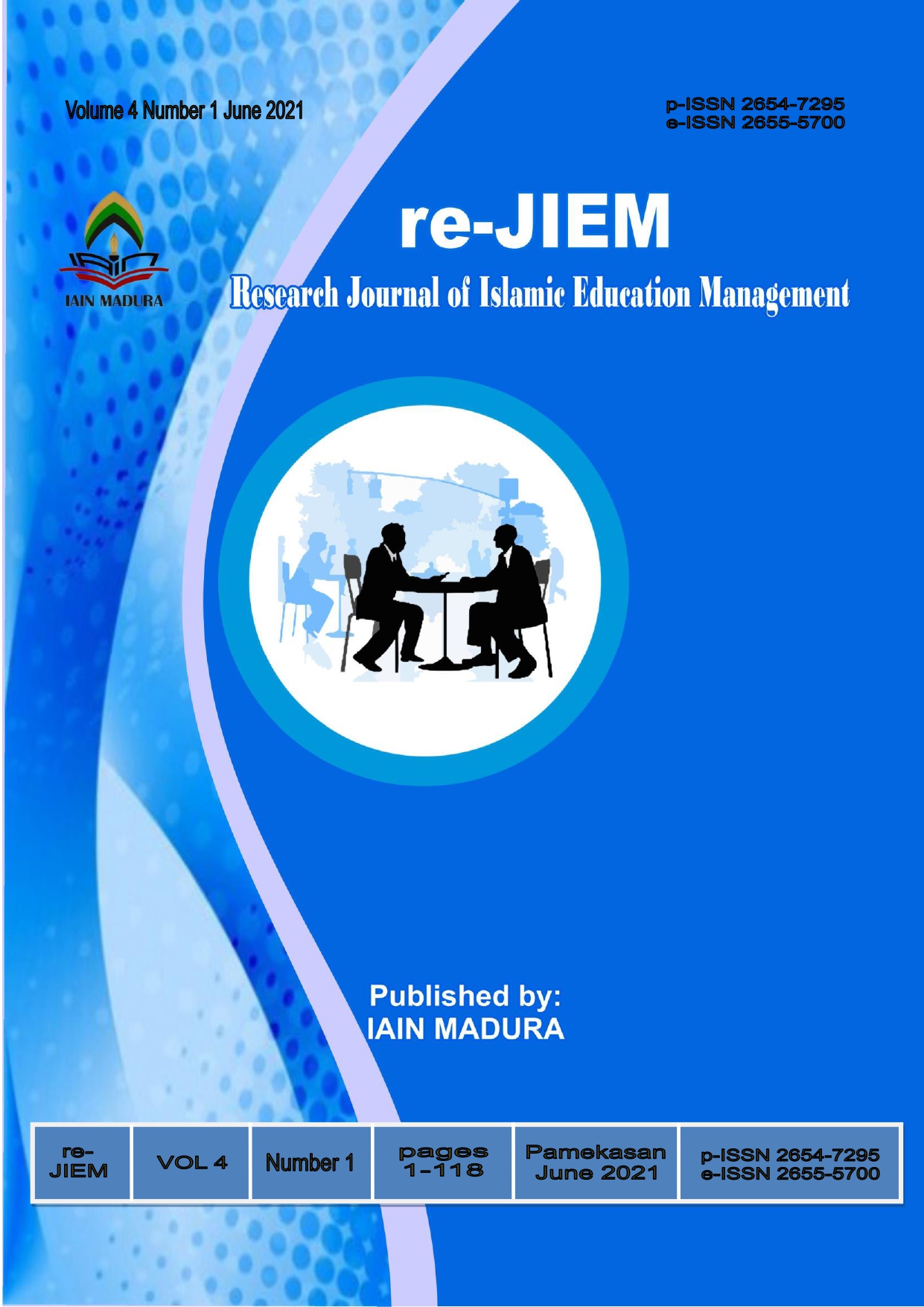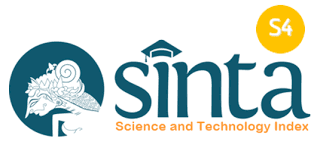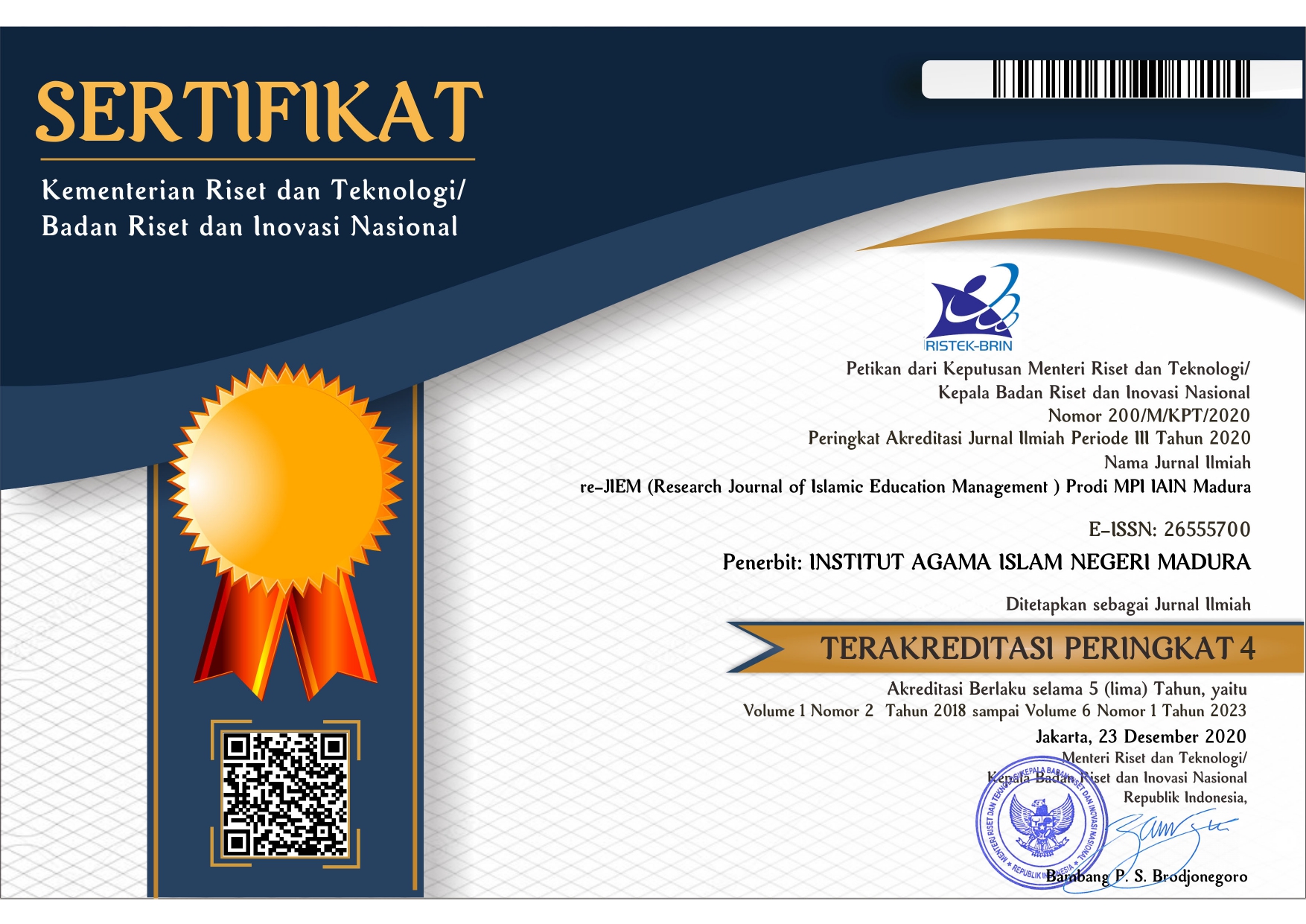KEPEMIMPINAN KEPALA MADRASAH DALAM MEMBUDAYAKAN AKHLAQUL KARIMAH SISWA DI MADRASAN ALIYAH NEGERI SAMPANG
 Abstract views: 388
,
Abstract views: 388
,
 PDF downloads: 307
PDF downloads: 307
Abstract
The leadership of the head of the madrasa is important in managing the madrasa he leads, including the formation of akhlaqul karimah. This research is a qualitative research with a descriptive type that portrays the leadership of the madrasa principal in cultivating akhlaqul karimah in MAN Sampang. There are three research focuses with the following findings. First, the form of civilizing akhlaqul karimah students applied at MAN Sampang is carried out every morning some teachers and BK welcome students who come, while students who enter the MAN Sampang environment will shake hands with the waiting teacher and BK teacher, not precede the teacher who walks in front of him not riding a motorcycle when passing in front of the teacher and madrasa lobby, reading prayers before and after KBM. The two leaderships of the madrasa head participated in carrying out existing policies, including being an example in cultivating good morals towards teachers and students. The three supporting factors in cultivating akhlaqul karimah at MAN Sampang are adequate infrastructure, policies from the madrasa principal, the willingness of the students themselves and the attitude of the education staff who directly meet with students will become role models for students at MAN Sampang.
Downloads
References
Alimin Miftahul, Muzammil, Keteladanan Guru dalam Menanamkan Nilai-nilai Keagamaan sebagai Upaya Pembinaan Akhlakul Karimah Siswa, Jurnal Pemikiran Keislaman Vol. 4, no. 1 juli 2020.
Asmaun Sahlan, Mewujudkan Budaya Religius di Sekolah Upaya Mengembangkan PAI dari Teori ke Aksi, Malang: UIN Maliki Press, 2010.
Bafadhol Ibrahim, Pendidikan Alkhlak Dalam Perspektif Islam, Jurnal Pendidikan Islam Vol. 06 No. 12, Juli 2017.
Helmawati, Meningkatkan Kinerja Kepala Sekolah/Madrasah Melalui Manajerial Skill, Jakarta: Rineka Cipta, 2014.
Manik, Ester& Kamal bustomi, Pengaruh Kepemimpinan Kepala Sekolah, Budaya Organisasi dan Motivasi Kerja terhadap Kinerja Guru pada SMP Negeri 3 Rancaekek Jurnal Ekonomi, Bisnis & EntrepreneurshipVol. 5, No. 2, Oktober 2011.
Maulida Ali, Metode dan Evaluasi Pendidikan Akhlaq dalam Hadist Nabawi, Edukasi Jurnal Pendidikan Vol. 04 , Januari 2014.
Muspiroh, Novianto, Peran Kepala Sekolah dalam Menciptakan Budaya Religius di Sekolah Dasar Negeri Grenjeng Kota Cirebon, Vol. 2, No. 2
Nivianty Djafri, Manajemen Kepemimpinan Kepala Sekolah, Yogyakarta: CV Budi Utama, 2012.
Nurhadi, Ali. “Implementasi Manajemen Strategi Berbasis Pembiasaan Dalam Menumbuhkan Karakter Religius Siswa Di Sman 1 Galis Pamekasan”, al-Afkar, Journal For Islamic Studies, 3(1, January), pp. 65–76. doi: 10.31943/afkar_journal.v3i1, January. 84. 2020.
Nurhadi Ali, Yusup Dedi, Manajemen Pembelajaran Berbasis Pendekatan Perubahan Perilaku dalam Meningkatkan Motivasi Belajar siswa di SMP Negeri 3 Pademawu Pamekasan, Jurnal re-Jiem 2, no. 2 Desember 2019.
Pamungkas Imam, Akhlaq Muslim Membangun Karakter Generasi Muda, Jurnal Pendidikan Universitas Garut Vol. 08 No. 01, 2014.
Saefullah, Manajemen Pendidikan Islam, Bandung: CV Pustaka Setia, 2012.
Solichin, Mohammad Muchlis. Akhlaq dan Tasawuf dalam Wacana Kontenporer, Surabaya: CV Salsabila Putra Pratama, 2014.
Copyright (c) 2021 Ali Nurhadi and Hasbiyallah Idris

This work is licensed under a Creative Commons Attribution-ShareAlike 4.0 International License.
Authors who publish with this journal agree to the following terms:
Authors retain copyright and grant the journal right of first publication with the work simultaneously licensed under a Creative Commons Attribution-ShareAlike 4.0 International License that allows others to copy and redistribute the material in any medium or format with an acknowledgment of the work's authorship and initial publication in this journal and also allows to remix, transform, and build upon the material for any purpose, even commercially with contributions under the same license as the original.
Authors are able to enter into separate, additional contractual arrangements for the non-exclusive distribution of the journal's published version of the work (e.g., post it to an institutional repository or publish it in a book), with an acknowledgment of its initial publication in this journal.
Authors are permitted and encouraged to post their work online (e.g., in institutional repositories or on their website) prior to and during the submission process, as it can lead to productive exchanges, as well as earlier and greater citation of published work.



























